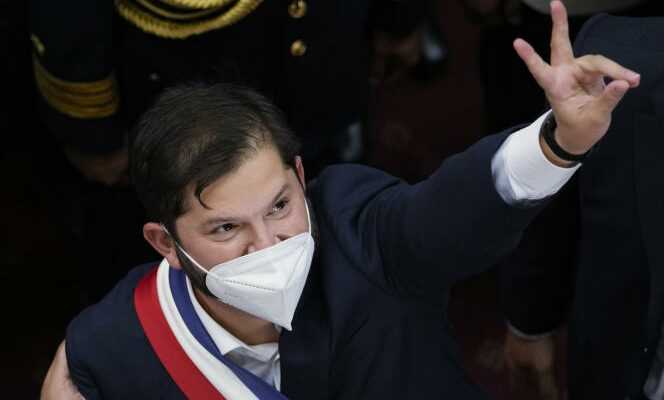At 36, Gabriel Boric officially became the youngest president in the history of Chile, after an investiture ceremony marked by a tribute to former president Salvador Allende.
“As Salvador Allende predicted almost fifty years ago, here we are again, dear compatriots, opening up great avenues where free men and women will pass to build a better society. Long live Chile! »launched the young head of state at the end of his address to the nation before the presidency, a clear reference to the last speech of the former socialist president, delivered just before his suicide, on September 11, 1973, from this palace de La Moneda then surrounded by the putschist forces of General Augusto Pinochet.
“We would not be here without your mobilizations”also advanced the ex-student leader, in particular in allusion to the social revolt which shook the country in 2019, in front of a crowd of tens of thousands of euphoric people massed in Place de la Constitution.
The first day was rich in symbolic gestures. During the investiture to succeed Sebastian Piñera (2010-2014, 2018-2022), Mr Boric swore, according to tradition, to respect the Constitution “in front of the Chilean people”but adding: “All Chilean Peoples”a reference to indigenous peoples, notably the Mapuche.
The 24 ministers of his government, 42 years old on average and mainly composed of women (14 out of 24), in particular in the sovereign positions of the interior, defense or foreign affairs, then took the oath.
“The tomb of neoliberalism”
About twenty international dignitaries attended the dubbing of the representative of a new generation of Chilean politics, including the presidents of Argentina, Alberto Fernandez; Peruvian, Pedro Castillo; Uruguayan, Luis Lacalle Pou; Bolivian, Luis Arce; and King Felipe VI of Spain.
At the end of the investiture ceremony at the seat of Parliament, in Valparaiso (150 km north-west of Santiago), from where the new president emerged on the arm of his companion, the new first lady, Irina Karamanos, Gabriel Boric boarded a convertible car driven, for the first time in protocol, by a woman.
The former student leader, deputy since 2014, who, as usual, did not wear a tie, must now go beyond symbols and strive to keep his promises and respond to hope. He had said to himself “convinced that the vast majority of Chileans demand structural changes”.
Political heir to the 2019 revolt, the president, elected in December at the head of a left-wing coalition, must find answers to the demands for the transformation of the health, education and pension systems, as well as to the demands of reduction of inequalities.
According to him, the solution lies in the establishment of a welfare state inspired by European social democracy and a break with neoliberalism, of which Chile was the laboratory under the dictatorship of Augusto Pinochet (1973-1990). “If Chile is the cradle of neoliberalism, it will also be its tomb”he had thus launched the evening of his victory in the primaries of the left against the communist candidate, Daniel Jadue, in July.
Lack of majority in Parliament
If the economic results of Chile for thirty years have been hailed and envied, they have been obtained at the cost of great inequalities (1% of the population owns 26% of the wealth, according to the United Nations Organization) and have led to the violence of 2019.
The outgoing president had been forced to give in to the demand for a new Constitution to be drafted. After the election of the members of a Constituent Assembly, its development is in progress and its new version will be submitted to referendum in the course of 2022.
“Boric begins in a favorable climate of public opinion, thanks to the political capital he obtained in the elections and with the appointment of his government” open to various sensitivities, predicts Marco Moreno, director of the School of Political Science at the Central University of Chile.
But he will have to reform against a backdrop of economic slowdown and by bringing together a Parliament far from being won over to his cause: “The great challenge that Boric will have to face is to establish a dialogue to overcome the legislative obstacles in order to have the capacity to finance his desires for a welfare state”believes Mr. Rodrigo Espinoza, professor at Diego Portales University.
